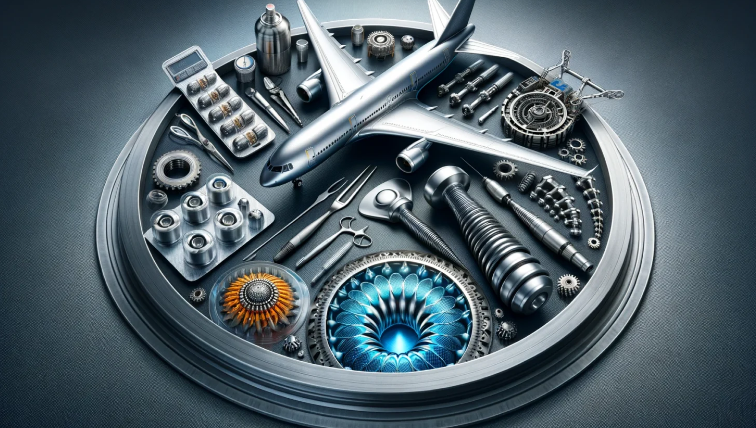The Impact of Titanium in Revolutionizing Modern Science and Technology
Titanium, a lustrous transition metal known for its strength, corrosion resistance, and lightweight properties, has become an essential material in today’s scientific and technological advancements. From aerospace engineering to medical innovation, the role of titanium is both expansive and transformative. As industries strive for high performance, durability, and sustainability, titanium continues to shine as a superior material. This article delves into the multifaceted contributions of titanium in advancing modern science, its applications across various sectors, and why it remains irreplaceable in cutting-edge innovations.
Titanium’s Unique Properties: A Scientific Marvel
Titanium (Ti), with its atomic number 22, is renowned for a combination of properties that make it invaluable in high-performance environments:
- Exceptional strength-to-weight ratio
- High resistance to corrosion
- Non-toxic and biocompatible
- High melting point (1,668 °C or 3,034 °F)
- Excellent fatigue resistance
These characteristics allow titanium to outperform other metals in challenging environments, earning its place in industries where reliability is paramount.
Titanium in Aerospace and Aviation: Lifting Innovation
One of the most significant applications of titanium lies in the aerospace and aviation sectors, where strength, weight, and thermal stability are critical. Aircraft structures, jet engines, and spacecraft components often incorporate titanium alloys to ensure performance at high altitudes and extreme temperatures.
- Lightweight Construction: Titanium’s low density reduces aircraft weight, improving fuel efficiency and performance.
- Durability in Harsh Conditions: Its resistance to oxidation and corrosion ensures structural integrity during long flights and space missions.
- High-Temperature Tolerance: Titanium alloys maintain strength even in the intense heat generated by jet engines.
NASA and aerospace giants like Boeing and Airbus frequently use titanium in their designs, making it essential for pushing the boundaries of space exploration and commercial aviation.
Medical Advancements Powered by Titanium
In the medical field, titanium is celebrated for its biocompatibility—it does not react with bodily fluids, making it ideal for surgical and dental implants.
- Orthopedic Implants: Titanium is commonly used in hip and knee replacements, spinal fusion devices, and bone screws.
- Dental Applications: Titanium implants serve as permanent roots for crowns and bridges due to their ability to fuse with jawbone tissue (osseointegration).
- Surgical Instruments: Precision tools made from titanium are durable, lightweight, and resistant to sterilization damage.
Thanks to its non-toxic nature and resilience, titanium is enabling longer-lasting medical solutions and improving patient recovery outcomes.
Titanium in Chemical and Marine Industries
In environments exposed to harsh chemicals or seawater, titanium’s corrosion resistance becomes a game-changer.
- Chemical Processing Equipment: Reactors, heat exchangers, and piping systems rely on titanium for its ability to withstand acids and chlorides without degrading.
- Desalination Plants: Titanium resists corrosion from saltwater, making it a go-to material in seawater filtration systems.
- Submarine and Offshore Applications: Marine vessels and underwater structures benefit from titanium’s durability in saline environments.
Titanium’s reliability in these sectors reduces maintenance costs and extends equipment lifespan, leading to greater operational efficiency.
Energy and Environmental Innovation with Titanium
As the world shifts toward sustainable energy solutions, titanium plays a vital role in green technology and energy systems.
- Nuclear Power Plants: Titanium is used in condensers and heat exchangers due to its resistance to radiation and corrosion.
- Solar Energy: Titanium dioxide (TiO₂) is a key material in photovoltaic cells and solar panels, helping to improve energy conversion rates.
- Environmental Cleanup: TiO₂ is also used in photocatalytic coatings to break down pollutants and clean the air and water, contributing to eco-friendly innovations.
These applications showcase titanium’s role in supporting clean, renewable energy and environmental sustainability.
Automotive and Industrial Applications: Enhancing Performance
The automotive industry leverages titanium for performance enhancement and efficiency:
- High-Performance Vehicles: Titanium is used in exhaust systems, valves, and connecting rods to reduce weight and increase engine efficiency.
- Electric Vehicles (EVs): With the push for lightweight components, titanium contributes to extended battery range and vehicle lifespan.
- Industrial Manufacturing: Titanium is utilized in tools, molds, and components that require high wear resistance and longevity.
By improving mechanical performance while reducing weight and maintenance, titanium boosts both productivity and energy efficiency across industrial sectors.
Titanium in Consumer Electronics and Everyday Use
Beyond heavy industry and science, titanium has found its way into consumer products, offering premium quality and style.
- Smartphones and Laptops: High-end devices use titanium for its sleek look and robustness without adding bulk.
- Eyewear and Watches: Lightweight and hypoallergenic, titanium frames offer superior comfort and durability.
- Sporting Goods: Tennis rackets, bicycles, and golf clubs benefit from titanium’s strength and low weight for enhanced performance.
Its aesthetic appeal, combined with functionality, makes titanium a desirable material in the luxury and lifestyle markets.
Future Prospects: Titanium and Emerging Technologies
The future of titanium is promising, especially as emerging technologies continue to demand materials that can perform under pressure.
- 3D Printing and Additive Manufacturing: Titanium powders are used in 3D printing complex parts for aerospace, medical, and defense applications.
- Nanotechnology: Titanium nanoparticles and TiO₂ are under research for targeted drug delivery, cancer treatment, and advanced coatings.
- Space Exploration: As humanity prepares for missions to Mars and beyond, titanium’s role in lightweight, durable spacecraft is more crucial than ever.
Ongoing research is exploring how titanium can be made more cost-effective through better extraction methods and recycling techniques, making it more accessible for widespread use.
Challenges and Considerations in Titanium Production
Despite its benefits, titanium does face a few challenges:
- High Cost of Extraction and Processing: The Kroll process, currently the most used method, is energy-intensive and expensive.
- Limited Availability: Although not rare, titanium requires complex refinement, which can limit supply chain scalability.
- Recycling Difficulties: Separating titanium from alloys and contaminants can be technically demanding, though efforts are underway to improve this process.
Overcoming these challenges is key to expanding titanium’s adoption in mass-market applications.
Conclusion: Titanium’s Enduring Role in Scientific Progress
Titanium is more than just a metal—it’s a catalyst for innovation across disciplines. Its unique properties, coupled with its versatile applications, have positioned it as a cornerstone of modern science and industry. From revolutionizing how we travel through space to enabling life-saving medical procedures and supporting a cleaner environment, titanium’s impact is far-reaching.
As research continues to uncover new uses and improve production methods, the role of titanium in shaping the future of science and technology is only set to grow. For industries seeking durability, efficiency, and innovation, titanium is—and will remain—an indispensable material.
Would you like a downloadable version of this article for web or print? Or should I optimize it further for a specific keyword or platform?

Also Read :
